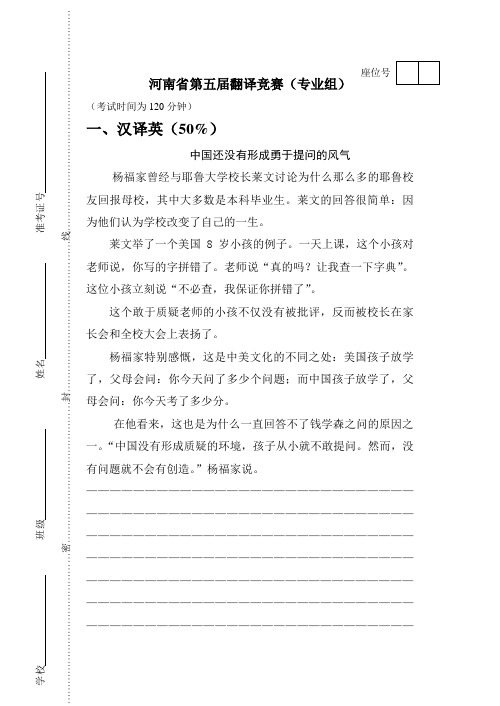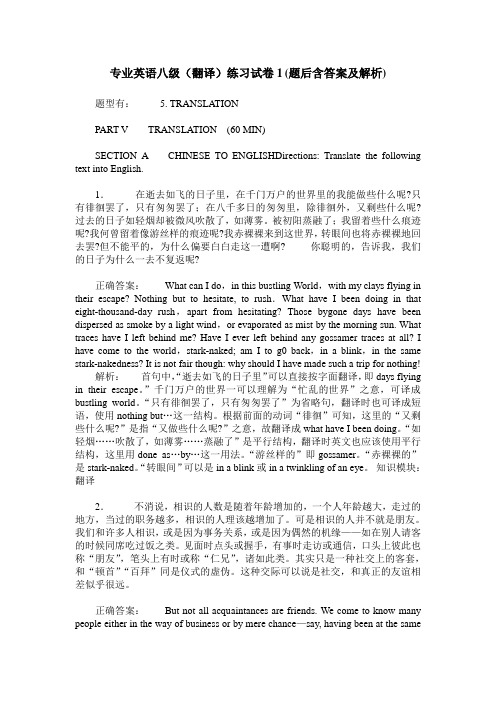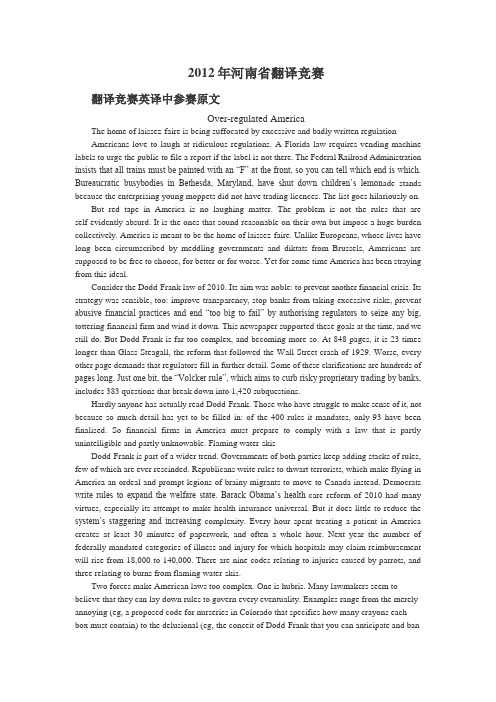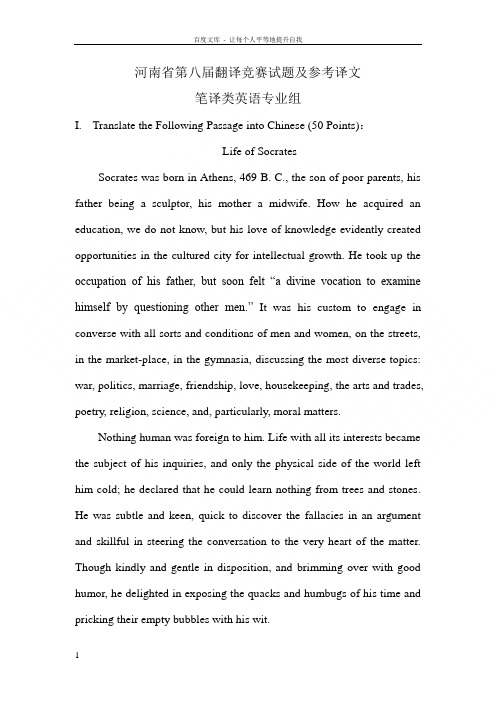河南省第八届翻译竞赛试题及参考译文英语专业组
英语专八考试翻译真题及参考答案

英语专八考试翻译真题及参考答案英语专八考试翻译真题及参考答案英语专业八级考试,全称为全国高校英语专业八级考试。
自1991年起由中华人民共和国教育部实行,考察全国综合性大学英语专业学生。
下面为大家带来了英语专八考试翻译真题及参考答案,欢迎大家参考!1997年E-C原文:Opera is expensive: that much is inevitable. But expensive things are inevitably the province(范围) of the rich unless we abdicate(退位、放弃) society’s power of choice. We can choose to make opera and other expensive forms of culture, accessible(易接近的,可达到的) to those who cannot individually pay for it. The question is: why should we? No body denies the imperatives(必要的)of food, shelter, defence, health and education. But even in a prehistoric cave, man-kind stretched out a hand of not just to eat, drink or fight, but also to draw. The impulse(冲动) towards culture, the desire to express and explore the world through imagination and representation(表述、陈述)is fundamental. In Europe, this desire has found fulfillment(完成、成就) in the masterpieces of our music, art, literature and theatre. These masterpieces are the touchstones(标准、试金石) for all our efforts; they are the touchstones for the possibilities to which human thought and imagination may aspire(立志、追求目标、渴望); they carry the most profound (深厚的、深刻的)messages that can be sent from one human to another.参考译文:欣赏歌剧是一种奢侈:你必须为此支付昂贵的票价。
2013河南省翻译竞赛试题

河南省第五届翻译竞赛(专业组) (考试时间为120分钟) 一、汉译英(50%) 中国还没有形成勇于提问的风气 杨福家曾经与耶鲁大学校长莱文讨论为什么那么多的耶鲁校友回报母校,其中大多数是本科毕业生。
莱文的回答很简单:因为他们认为学校改变了自己的一生。
莱文举了一个美国8岁小孩的例子。
一天上课,这个小孩对老师说,你写的字拼错了。
老师说“真的吗?让我查一下字典”。
这位小孩立刻说“不必查,我保证你拼错了”。
这个敢于质疑老师的小孩不仅没有被批评,反而被校长在家长会和全校大会上表扬了。
杨福家特别感慨,这是中美文化的不同之处:美国孩子放学了,父母会问:你今天问了多少个问题;而中国孩子放学了,父母会问:你今天考了多少分。
在他看来,这也是为什么一直回答不了钱学森之问的原因之一。
“中国没有形成质疑的环境,孩子从小就不敢提问。
然而,没有问题就不会有创造。
”杨福家说。
————————————————————————————————————————————————————————————————————————————————————————————————————————————————————————————————————————————————————————————————————————————————————————————————————学校班级姓名准考证号………………………………………密……………………………………封………………………………………线………………………………………………………… 座位号————————————————————————————————————————————————————————————————————————————————————————————————————————————————————————————————————————————————————————————————————————————————————————————————————————————————————————————————————————————————————————————————————————————————————————————————————————————————————————————————————————————————————————————————————————————————————————————————————————————————————————————————————————————————————————————————————————————————————————————————————————————————————————————————————————————————————————————————————————————————————————————————————————————————————————————————————————————————————————————————————————————————————————————————————————————————————————————二、英译汉(50%)The Longevity Gap between Men and WomenA century ago American men outnumbered and outlived the women. But in the 20th century, women began living longer, primarily because pregnancy and childbirth had become less dangerous. The gap grew steadily. In 1946, for the first time ever in the United States, females outnumbered males.Part of the reasons are self-inflicted. Men smoke more than women, drink more and take more life-threatening chances. Men are murdered (usually by other men) three times as often as women are. They commit suicide at a higher rate and have more than twice as many fatal car accidents as women do. Men are more likely to be involved in alcohol-related fatalities.But behavior doesn't explain away the longevity gap. Nor is stress the answer.In the 1950s, as heart disease claimed more and more male victims, pressure in the corporate boardroom was blamed. Let women venture out of the home and into the line of fire, doctors said, and they would begin dying at the same rate as men. But a funny thing happened on the way to the funeral.Between 1950 and 1985, the percentage of employed women in the United States nearly doubled. Those working women, several studies have found; are as healthy as women at home.Today, some scientists studying the gender gap believe that the data point to one conclusion: Mother Nature may be partial to women.————————————————————————————————————————————————————————————————————————————————————————————————————————————————————————————————————————————————————————————————————————————————————————————————————————————————————————————————————————————————————————————————————————————————————————————————————————————————————————————————————————————————————————————————————————————————————————————————————————————————————————————————————————————————————————————————————————————————————————————————————————————————————————————————————————————————————————————————————————————————————————————————————————————————————————————————————————————————————————————————————。
专业英语八级(翻译)练习试卷1(题后含答案及解析)

专业英语八级(翻译)练习试卷1(题后含答案及解析) 题型有: 5. TRANSLATIONPART V TRANSLATION (60 MIN)SECTION A CHINESE TO ENGLISHDirections: Translate the following text into English.1.在逝去如飞的日子里,在千门万户的世界里的我能做些什么呢?只有徘徊罢了,只有匆匆罢了;在八千多日的匆匆里,除徘徊外,又剩些什么呢?过去的日子如轻烟却被微风吹散了,如薄雾。
被初阳蒸融了;我留着些什么痕迹呢?我何曾留着像游丝样的痕迹呢?我赤裸裸来到这世界,转眼间也将赤裸裸地回去罢?但不能平的,为什么偏要白白走这一遭啊? 你聪明的,告诉我,我们的日子为什么一去不复返呢?正确答案:What can I do,in this bustling World,with my clays flying in their escape? Nothing but to hesitate, to rush.What have I been doing in that eight-thousand-day rush,apart from hesitating? Those bygone days have been dispersed as smoke by a light wind,or evaporated as mist by the morning sun. What traces have I left behind me? Have I ever left behind any gossamer traces at all? I have come to the world,stark-naked; am I to g0 back,in a blink,in the same stark-nakedness? It is not fair though: why should I have made such a trip for nothing!解析:首句中,“逝去如飞的日子里”可以直接按字面翻译,即days flying in their escape。
2012年河南省翻译竞赛真题

2012年河南省翻译竞赛翻译竞赛英译中参赛原文Over-regulated AmericaThe home of laissez-faire is being suffocated by excessive and badly written regulationAmericans love to laugh at ridiculous regulations. A Florida law requires vending-machine labels to urge the public to file a report if the label is not there. The Federal Railroad Administration insists that all trains must be painted with an “F” at the front, so you can tell which end is which. Bureaucratic busybodies in Bethesda, Maryland, have shut down children’s lemon ade stands because the enterprising young moppets did not have trading licences. The list goes hilariously on.But red tape in America is no laughing matter. The problem is not the rules that are self-evidently absurd. It is the ones that sound reasonable on their own but impose a huge burden collectively. America is meant to be the home of laissez-faire. Unlike Europeans, whose lives have long been circumscribed by meddling governments and diktats from Brussels, Americans are supposed to be free to choose, for better or for worse. Yet for some time America has been straying from this ideal.Consider the Dodd-Frank law of 2010. Its aim was noble: to prevent another financial crisis. Its strategy was sensible, too: improve transparency, stop banks from taking excessive risks, prevent abusive financial practices and end “too big to fail” by authorising regulators to seize any big, tottering financial firm and wind it down. This newspaper supported these goals at the time, and we still do. But Dodd-Frank is far too complex, and becoming more so. At 848 pages, it is 23 times longer than Glass-Steagall, the reform that followed the Wall Street crash of 1929. Worse, every other page demands that regulators fill in further detail. Some of these clarifications are hundreds of pages long. Just one bit, the “Volcker rule”, which aims to curb risky proprietary trading by banks, includes 383 questions that break down into 1,420 subquestions.Hardly anyone has actually read Dodd-Frank. Those who have struggle to make sense of it, not because so much detail has yet to be filled in: of the 400 rules it mandates, only 93 have been finalised. So financial firms in America must prepare to comply with a law that is partly unintelligible and partly unknowable. Flaming water-skisDodd-Frank is part of a wider trend. Governments of both parties keep adding stacks of rules, few of which are ever rescinded. Republicans write rules to thwart terrorists, which make flying in America an ordeal and prompt legions of brainy migrants to move to Canada instead. Democrats write rules to expand the welfare state. Barack Obama’s health-care reform of 2010 had many virtues, especially its attempt to make health insurance universal. But it does little to reduce the system’s staggering and increasing complexity. Every hour spent treating a patient in America creates at least 30 minutes of paperwork, and often a whole hour. Next year the number of federally mandated categories of illness and injury for which hospitals may claim reimbursement will rise from 18,000 to 140,000. There are nine codes relating to injuries caused by parrots, and three relating to burns from flaming water-skis.Two forces make American laws too complex. One is hubris. Many lawmakers seem to believe that they can lay down rules to govern every eventuality. Examples range from the merely annoying (eg, a proposed code for nurseries in Colorado that specifies how many crayons each box must contain) to the delusional (eg, the conceit of Dodd-Frank that you can anticipate and banevery nasty trick financiers will dream up in the future). Far from preventing abuses, complexity creates loopholes that the shrewd can abuse with impunity.The other force that makes American laws complex is lobbying. The government’s drive to micromanage so many activities creates a huge incentive for interest groups to push for special favours. When a bill is hundreds of pages long, it is not hard for congressmen to slip in clauses that benefit their chums and campaign donors. The health-care bill included tons of favours for the pushy. Congress’s last, failed attempt to regulate greenhouse gases was even worse.Complexity costs money. Sarbanes-Oxley, a law aimed at preventing Enron-style frauds, has made it so difficult to list shares on an American stockmarket that firms increasingly look elsewhere or stay private. America’s share of initial public offerings fell from 67% in 2002 (when Sarbox passed) to 16% last year, despite some benign tweaks to the law. A study for the Small Business Administration, a government body, found that regulations in general add $10,585 in costs per employee. It’s a wonder the jobless rate isn’t even higher than it is.A plea for simplicityDemocrats pay lip service to the need to slim the rulebook –Mr Obama’s regulations tsar i s supposed to ensure that new rules are cost-effective. But the administration has a bias towards overstating benefits and underestimating costs (see article). Republicans bluster that they will repeal Obamacare and Dodd-Frank and abolish whole government agencies, but give only a sketchy idea of what should replace them.America needs a smarter approach to regulation. First, all important rules should be subjected to cost-benefit analysis by an independent watchdog. The results should be made public before the rule is enacted. All big regulations should also come with sunset clauses, so that they expire after, say, ten years unless Congress explicitly re-authorises them.More important, rules need to be much simpler. When regulators try to write an all-purpose instruction manual, the truly important dos and don’ts are lost in an ocean of verbiage. Far better to lay down broad goals and prescribe only what is strictly necessary to achieve them. Legislators should pass simple rules, and leave regulators to enforce them.Would this hand too much power to unelected bureaucrats? Not if they are made more accountable. Unreasonable judgments should be subject to swift appeal. Regulators who make bad decisions should be easily sackable. None of this will resolve the inevitable difficulties of regulating a complex modern society. But it would mitigate a real danger: that regulation may crush the life out of America’s economy.选自The Economist, Feb 18th-24th, p8翻译竞赛中译英参赛原文“悦读”的“姿势”从一定意义说,一个民族的发展史就是它的阅读史,一个人亦如此。
河南省第八届翻译竞赛试题及参考译文英语专业组

河南省第八届翻译竞赛试题及参考译文笔译类英语专业组I. Translate the Following Passage into Chinese (50 Points):Life of SocratesSocrates was born in Athens, 469 B. C., the son of poor parents, his father being a sculptor, his mother a midwife. How he acquired an education, we do not know, but his love of knowledge evidently created opportunities in the cultured city for intellectual growth. He took up the occupation of his father, but soon felt “a divine vocation to examine himself by questioning other men.”It was his custom to engage in converse with all sorts and conditions of men and women, on the streets, in the market-place, in the gymnasia, discussing the most diverse topics: war, politics, marriage, friendship, love, housekeeping, the arts and trades, poetry, religion, science, and, particularly, moral matters.Nothing human was foreign to him. Life with all its interests became the subject of his inquiries, and only the physical side of the world left him cold; he declared that he could learn nothing from trees and stones. He was subtle and keen, quick to discover the fallacies in an argument and skillful in steering the conversation to the very heart of the matter. Though kindly and gentle in disposition, and brimming over with good humor, he delighted in exposing the quacks and humbugs of his time and pricking their empty bubbles with his wit.Socrates exemplified in his conduct the virtues which he taught: he was a man of remarkable self-control, magnanimous, noble, frugal, and capable of great endurance; and his wants were few. He gave ample proof, during his life of seventy years, of physical and moral courage in war and in the performance of his political duties. Condemned by his own people, on a false charge of atheism and of corrupting the youth, to drink the poison hemlock (399 B. C.), he died as beautifully as he lived.参考译文:苏格拉底的生平(1分)1苏格拉底于公元前469年生于雅典,父母是穷人。
专业英语八级(翻译)练习试卷3(题后含答案及解析)

专业英语八级(翻译)练习试卷3(题后含答案及解析) 题型有: 5. TRANSLATIONPART V TRANSLATION (60 MIN)SECTION A CHINESE TO ENGLISHDirections: Translate the following text into English.1.择书比择友简单得多。
不擅辞令、厌恶应酬的人,可以自由自在地徜徉于书林之中,游目四顾,俯拾皆友。
看书,可以博览,可以细嚼,没有人会怪你喜新厌旧,也没有人要求你从一而终。
你大可以从一本书换到另一本,喜爱的书,不妨一读再读;不耐看的书,又可随手抛下,谁也不会因此而伤心失望。
人际关系错综复杂,那“书际关系”呢?只要花点时间去了解,再高深的学问也弄得明白。
正确答案:It is much easier to choose a book than a friend. One who is poor at speech and shuns socializing will nevertheless feel like being surrounded by friends while sauntering freely in the midst of book. Books can be read cursorily, or chewed and digested. None will ever call you fickle-minded, and none will ever demand that you be constant in your affection. You can go from one book to another. And you can read your favorite book over and over again. When you lay aside the book you dislike, none will ever feet hurt or disappointed. While interpersonal relations are most complicated, what about your relations with books? Devote your time to studies, and you will be able to acquire any knowledge no matter how profound it is.解析:这段材料选自金圣华的《书与人》,题材有关读书之乐,是说明文体,用词讲究,出现了四字成语,因此正确领会原文含义,将意思既完整地翻译又符合英语表达习惯是重中之重。
大学专业英语八级翻译类模拟试卷(带答案)
大学专业英语八级翻译类模拟试卷TRANSLATION1、如果“义”代表一种伦理的人生态度,“利”代表一种功利的人生态度,那么,我所说的“情”便代表一种审美的人生态度。
它主张率性而行,适情而止,每个人都保持自己的真性情。
你不是你所信奉的教义,也不是你所占有的物品,你之为你仅在于你的真实“自我”。
生命的意义不在于奉献或占有,而在创造,创造就是人的真性情的积极展开,是人在实现其本质力量时所获得的情感上的满足。
2、当今世界正处在深刻变革与调整之中。
多极化和全球化继续深入发展,国与国之间互相联系日益紧密,利益交融,休戚与共。
求和平、谋发展、促合作仍是这个时代不可阻挡的潮流。
然而,我们也应看到,世界仍然不安宁,局部冲突和热点问题此起彼伏;全球经济失衡加剧,南北差距持续扩大;气候变化、能源和资源等问题十分突出。
应对挑战,维护和平,促进发展已成为国际社会面临的紧迫而艰巨的任务。
3、有时候,我想,一个秘密对自己亲人隐瞒长达十几年乃至一辈子,这是不公平的。
但如果不这样,你的国家就有可能不存在,起码有不存在的危险,不公平似乎也只有让他不公平了。
多少年来,我就是这样想的,或许也只有这样想,我才能理解珍弟,否则珍弟就是一个梦,白日梦,睁眼梦,梦里的梦,恐怕连擅长释梦的他自己都难以理解这个奇特又漫长的梦了……4、为了看日出,我常常早起。
那时天还没有大亮,周围非常清静,船上只有机器的响声。
天空还是一片浅蓝,颜色很浅。
转眼间天边出现了一道红霞,慢慢地在扩大它的范围,加强它的亮光。
我知道太阳要从天边升起来了,便目不转眼地望着那里。
果然过了一会儿,在那个地方出现了太阳的小半边脸,红是真红,却没有亮光。
这个太阳好像负着重荷似地一步一步、慢慢地努力上升,到了最后,终于冲破了云霞,完全跳出了海面,颜色红得非常可爱。
5、中国民俗文化村是国内第一个荟萃各民族的民间、民俗风情和民居建筑于一园的大型文化游览区。
它坐落在风光秀丽的深圳湾畔,占地18万平方米。
专业英语八级汉译英(记叙文类)强化练习试卷1(题后含答案及解析)
专业英语八级汉译英(记叙文类)强化练习试卷1(题后含答案及解析)题型有: 5. TRANSLATIONPART V TRANSLATION (60 MIN)SECTION A CHINESE TO ENGLISHDirections: Translate the following text into English.1.乔羽的歌大家都熟悉。
但他另外两大爱好却鲜为人知,那就是钓鱼和喝酒。
晚年的乔羽喜爱垂钓,他说:“有水有鱼的地方大都是有好环境的,好环境便会给人好心情。
我认为最好的钓鱼场所不是舒适的、给你准备好饿鱼的垂钓园,而是那极其有吸引力的大自然野外天成的场所。
”钓鱼是一项能够陶冶性情的运动,有益于身心健康。
乔羽说:“钓鱼可分三个阶段:第一阶段是吃鱼;第二阶段是吃鱼和情趣兼而有之;第三阶段主要是约趣,面对一池碧水,将忧心烦恼全都抛到一边,使自己的身心得到充分休息。
”正确答案:Qiao Yu liked fishing in his late years. He said, “Mostly speaking, a place with water and fish is necessarily blessed with a nice setting, which in return keeps people in good mood. The best places for fishing, it seems to me, are not those commercial fishing centers which provide you with all the conveniences and where fish are kept hungry for ready capture, but attractive natural water bodies in out-of-the-way places. “ Fishing is an outdoor sport that can help cultivate your mind and it is good for our mental and physical health. Qiao Yu claimed, “There are three states for fishing. The first state is for fish only. The second one is both for eating fish and for the pleasure of fishing. The third one is just for the pleasure of fishing. When facing a pool of green water, you forget all your worries and annoyance and enjoy a good rest, both mentally and physically. “解析:1.第二段第一句中“晚年的”可以翻译为in one’s late years或in one’sold age。
英语专业8级考试翻译部分答案【对照版】
构成了我们全部努力的试金石。作为试 思想和想象力可及程度的试金石。它们
2015年河南省翻译竞赛试题答案
2015年河南省翻译竞赛试题(专业组)参考译文I. Translate the Following Passage into Chinese (50 Points):人类与地球(1分)《创世纪》里有许多故事,是说人类想扮演上帝的角色,最终受到惩罚。
(2分)然而,在这个科学至上的时代,人类正在越来越多地行使着上帝的权力。
(3分)我们人类对地球上的所有生物拥有无可挑战的统治权。
(2分)为了满足自己的需求,我们改变了地球的面貌,把森林夷为平地,将广袤的草原开垦为农田。
(3分)在陆地上,大部分的生产力都贡献给我们,用以满足我们对食物、燃料和纺织品的需求。
在海洋上,人们昼夜不停地撒网捕捞,获取人类大脑和身体发育所需的鱼油及蛋白质。
(5分)因此,人类在进化史上显然已经获得了前所未有的成就。
(3分)然而,这一重大成就也有其负面影响。
(2分)人类统治地球的时代对整个生物圈来说是一场大的灾难。
(4分)我们改造了地球,让它为我们提供食物和燃料,但同时把所有和我们争夺资源的生物推到了灭绝的边缘。
(3分)然而最令人惊讶的是,我们给地球带来了巨大的改变,却对此毫无意识,并且还悠然自得。
(3分)即便是那些最主张环境保护的人士对我们人类角色的真实作用也躲闪回避,他们曾经希望消失了的野生物种有一天能够恢复如初。
(3分)有一些人否认气候变化,他们的观点占了上风,多多少少是由于社会上有一种舆论导向,认为人类只是这个庞大星球上极其微小的一份子,无论我们做什么都不会影响到整个地球。
这个观点就像一股强大的文化暗流,在一定程度上对否认气候变化者的观点起到了推波助澜的作用。
(7分)确实,我们可能阻止不了地震和海啸,(2分)但是强有力的科学证据表明,我们对这个星球上庞大的生物地球化学循环所进行的干涉,正在迅速威胁到地球本身,从而也威胁到我们人类这个物种的生存。
(6分)II. Translate the Following Passage into English (50 Points):Self-confidence and Success(1分)“Some might think that I was asking for trouble.(2分)Others evensaid “You can live very comfortably in the rest of your life even you do not read for the doctorial degree(even without a doctor degree) since you have won so many honors and prides.(5分) Even if you go to read for the doctorialdegree (go for a doctorate), it is not necessary for you to work so hard.(3分)You might as well hire someone to write a doctorial desert for you.”(3分) But my purpose of going to university is to fulfill my dream of my learning at the university instead of “getting gilded”.(3分) While communicating with foreign friends, I deeply felt my insufficient knowledge and obstacles in communication. (3分)Though with a poor foundation in English, I don’t want to take an easy way or a short-cut, not to mention that I am in such internationally famous (well-known) universities as Tsinghua and Cambridge, which enjoy a high reputation for their rigorous scholarship and in which no cheating is tolerable. (6分)Jiaozi (dumplings) might be quickly-frozen, but talents cannot be produced by crash courses.(3分)Deng Yaping’s gift has not cont ributed much to her success in her studies and glory in playing Pingpang (table-tennis). (4分)On the contrary, in both her studies and Pingpang (table-tennis) career, it is her fortitudinous (indomitable) will and up-and-coming attitudes towards life that helped her overcome difficulties and win one golden prize after another in her life. (6分)It was in her second year of her doctorial study at Cambridge when Deng Yapiing, as mentioning her study, said, “It is hard, too hard for me. I feel great pressure on me. (5分)I am straining myself all day long so I feel extremelytired.(2分) But I should be grateful to the experience of being a student for it has brought me to a new world and found the new value in me……”(4分)Struggle, struggle and struggle! No matter as an athlete or a student, Deng Yaping is almost too rigorous to herself: “I have to be successful. I have no excuse of failure.” It is the demonstration of her self-confidence.--。
- 1、下载文档前请自行甄别文档内容的完整性,平台不提供额外的编辑、内容补充、找答案等附加服务。
- 2、"仅部分预览"的文档,不可在线预览部分如存在完整性等问题,可反馈申请退款(可完整预览的文档不适用该条件!)。
- 3、如文档侵犯您的权益,请联系客服反馈,我们会尽快为您处理(人工客服工作时间:9:00-18:30)。
河南省第八届翻译竞赛试题及参考译文笔译类英语专业组I. Translate the Following Passage into Chinese (50 Points):Life of SocratesSocrates was born in Athens, 469 B. C., the son of poor parents, his father being a sculptor, his mother a midwife. How he acquired an education, we do not know, but his love of knowledge evidently created opportunities in the cultured city for intellectual growth. He took up the occupation of his father, but soon felt “a divine vocation to examine himself by questioning other men.”It was his custom to engage in converse with all sorts and conditions of men and women, on the streets, in the market-place, in the gymnasia, discussing the most diverse topics: war, politics, marriage, friendship, love, housekeeping, the arts and trades, poetry, religion, science, and, particularly, moral matters.Nothing human was foreign to him. Life with all its interests became the subject of his inquiries, and only the physical side of the world left him cold; he declared that he could learn nothing from trees and stones. He was subtle and keen, quick to discover the fallacies in an argument and skillful in steering the conversation to the very heart of the matter. Though kindly and gentle in disposition, and brimming over with good humor, he delighted in exposing the quacks and humbugs of his time and pricking their empty bubbles with his wit.Socrates exemplified in his conduct the virtues which he taught: he was a man of remarkable self-control, magnanimous, noble, frugal, and capable of great endurance; and his wants were few. He gave ample proof, during his life of seventy years, of physical and moral courage in war and in the performance of his political duties. Condemned by his own people, on a false charge of atheism and of corrupting the youth, to drink the poison hemlock (399 B. C.), he died as beautifully as he lived.参考译文:苏格拉底的生平(1分)1苏格拉底于公元前469年生于雅典,父母是穷人。
(2分)2父亲是雕刻家,母亲是助产士。
(2分)3他怎样受的教育,我们不得而知。
(3分)4但他对知识的热爱,在这有文化的城市里显然为他的知识增长创造了机会。
(3分)5他继承父业,不久感到“神谕要他借询问别人来考察自己”。
(3分)6他有一种习惯,在大街上、市场里和运动场里同各种处于不同情况的男人和女人谈话,讨论各式各样的问题,如战争、政治、婚姻、友谊、爱情、家政、艺术、商业、诗歌、宗教和科学,特别是道德问题。
(6分)7他熟悉人类的一切事务,人生的各个方面都是他研究的课题。
(3分)8他只对物理世界不感兴趣,因为他宣称从树木和石头那里学不到什么。
(3分)9他精明敏锐,能很快发现辩论中的谬误,善于把谈话引到问题的核心。
(4分)10他虽然性情温和文雅,谈笑风生,却喜欢揭露那时代的江湖骗子,用他的智慧戳穿他们空虚的老底。
(5分)11苏格拉底的行为体现他所教导的德性。
(3分)12他极为克己、豪爽、高尚、勤俭,有很大的耐性,没什么欲望。
(4分)13在七十年的一生中,在战争和执行政治任务时,他在行动和精神上都表明他很有勇气。
(3分)14因被诬告为不信神和腐蚀青年,他被国人判处死刑,于公元前399年饮鸩而死。
(3分)15他死得像活着时一样壮丽。
(2分)II. Translate the Following Passage into English. (50 Points)九旬院士台上拄拐作报告,90后学生台下一片片睡到,一大早看到新闻中这样的画面对比,真让人难过!有人说这像个笑话,不错,学生素质沦落至此,品德教育失败至此,的确像个笑话。
发生这样的事情,大多数人都表示很气愤,而学生则成为众矢之的。
大家普遍认为,首先,一个人应该有起码的尊重知识的礼貌!退一步讲,一个人应该有起码的尊重老人的礼貌!德高望重的老前辈以92岁高龄,仍孜孜不倦,为大家传道授业解惑,作为后生,怎好意思睡?其实不光听讲座,如今大学生课堂上睡觉、逃课也是家常便饭。
这固然有老师讲课不吸引人的原因,可大学生个人素质的滑坡,也着实堪忧。
老师讲的是做人道理,学生想的是功名利禄;老师讲的是终身发展,学生要的是急功近利;老师讲的是如何走正道,学生想的是如何走捷径。
须知课堂上趴着,人生中很可能会趴下;课堂上睡倒的,不仅仅是学生的身体,还有他们的教养、道德和灵魂。
此情此景,令人堪忧。
千年的精气神若为物质充裕,而理想迷失,则未来何处去?江山何人守?少年强则国强,如果我们的少年都是这种状态,如何能志存高远,身体力行?不但其个人发展令人堪忧,国家的发展和民族的梦想也十分堪忧。
参考译文:Rows of students born in the 1990s fell asleep amid a presentation delivered by an academician in his nineties and on crutches! (2分) A stark comparison of photos carried in the morning news coverage is truly saddening. (2分) Some call it a pathetic joke. That makes perfect sense, given the fall in morality of students and failed moral education in China. (3分)Most people feel outraged by such a shameful happening, and those students shown in the photos come under fire. (3分) After all, one must be courteous enough to respect knowledge in the first place. (1分) Students must show due respect to the lecturer as he is imparting knowledge to them, to say the least. (2分) How could the post-90sstudents have the nerve to fall asleep when a venerable professor was giving a lecture tirelessly at the age of 92? (3分)Presentation aside, it has become the norm for some college students to sleep in class or play truant. (2分) This naturally has something to do with unappealing lecturers, but the fall in morality is also a cause for concern. (2分) While teachers lecture on how to be an upright man, students crave for fame and fortune. (3分) Teachers talk about lifelong learning, but students seek instant success. (3分)Teachers shed light on how to succeed in an honest way, yet students look for a shortcut. (3分) Those students must be aware of potential failure later on due to their sleep in class now. (4分) Sleep in class means more than just physical lethargy, which reflects degradation in their soul, morality and upbringing. (4分)Alas! This is a truly worrisome development. (2分) What will future hold for them and where will China go from here once these students are totally materialistic without any lofty ideals? (4分) A promising younger generation leads to a stronger nation. (1分) But how can we count on these discouraging students to harbor ambitions and practice what they preach going forward? (3分) Ultimately, if this goes unchecked, their personal growth, our nation-building and the Chinese dream will remain elusive. (3分)。
